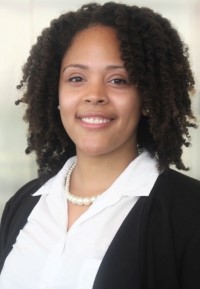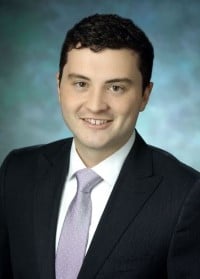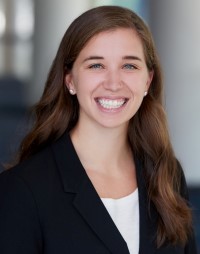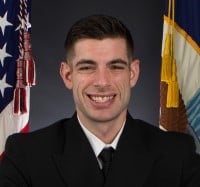The EMRA and ACEP Health Policy Academy is a highly selective, year-long program that trains you to become a policy advocate in emergency medicine. It’s designed to give passionate residents like you the opportunity to impact policy within EM at a local and national level and set you up for a lifetime of advocacy and national involvement.
Congratulations to our most recent class of Health Policy Academy Fellows: Jordan Vaughn, Jose Reyes, Micaela LaRose, and Shane Solger!

Jordan Vaughn, MD
Health Policy Academy Fellow
LSU Spirit of Charity
Dr. Vaughn is from Seattle but now considers herself a New Orleans transplant as a result of being a military brat. She graduated medical school from The University of Rochester Medical and Dental School in Rochester, NY. She has a special interest in domestic and global health equity with a focus on DEI initiatives, violence injury and prevention, and community engagement. As chief resident, she was in charge of recruitment, overseeing social EM curriculum, scheduling, facilitating professional development, and other administrative duties. Dr. Vaughn is now a clinical assistant professor of medicine, associate director of social EM, and associate director of DEI at Louisiana State University and public health clinical director for the City of New Orleans Health Department. When she is not working, Dr. Vaughn loves to travel and spend time with her husband, daughter, and extended family in Louisiana.
EMRA: What did you gain from your year-long experience as a Health Policy Academy Fellow?
Dr. Vaughn: As a Health Policy Academy Fellow, I have been fortunate to meet and learn from so many individuals who have dedicated their careers to advocacy. To be able to learn about the process of policymaking, and then apply those skills at ACEP Council and Representative Council, have been invaluable. I look forward to applying the skills learned this past year to continue to educate medical trainees and faculty.
EMRA: Why would you encourage others to apply for Health Policy Academy?
Dr. Vaughn: Whether you have had no experience and are interested in policy or have experience and are looking to expand that knowledge, HPA is for you. I have learned so much from my co-fellows who brought different experiences and perspectives to our cohort this year. Our Health Policy Academy directors, guest speakers, and EMRA board were so supportive and truly wanted us to succeed at every step this past year. Advocating for students and residents at EMRA and ACEP through lobbying, creating, and passing policy that impacts our entire specialty is life changing, and I recommend that any resident who would like to gain more involvement in this field apply for the Academy. I’ve been able to strengthen existing skills and have learned skills that I plan to apply in my advocacy career.
EMRA: What specific policy (or policies) do you hope to focus on, and advocate for, as a direct result of your involvement in Health Policy Academy? (In other words, what issues affecting the realm of EM are important to you?)
Dr. Vaughn: My passions and focus in advocacy surround health equity and social emergency medicine related policy including MAT, access to care, and violence prevention. Furthermore, I will remain involved in advocating for the specialty of emergency medicine to ensure the future generations of attendings, trainees, and patients are protected and taken care of. It is important that as a specialty we continue to advocate for not only ourselves but our patients.

Jose Reyes, MD
Health Policy Academy Fellow
Cook County Health
Dr. Reyes’ professional goals were shaped by his life as a first-generation Mexican-American in a majority-minority border town rife with disparities. His professional goals include improving the care of marginalized groups through research that can be used to craft and implement new programs or policies at the state and local levels. Dr. Reyes believes that through the combined efforts of research, community organizing, and government policy, change is possible.
EMRA: What did you gain from your year-long experience as a Health Policy Academy Fellow?
Dr. Reyes: Over the year, I learned so much about being a leader in organized medicine. This fellowship will give you the skills to develop effective and realistic policy resolutions, will promote your public speaking ability, and will give you the opportunity to speak up on items you care about, developing skillfulness in how you promote your perspective in a collaborative manner. This fellowship will not only give you concrete experience in drafting and promoting policy, but it will also build your potential as a leader.
EMRA: Why would you encourage others to apply for Health Policy Academy?
Dr. Reyes: You should apply to the Health Policy Academy if you want to be a future leader in policy and organized medicine. Even if you have experience in AMA or other organizations, you will be involved in every step of the policy process, from drafting policy, to evaluating policy, to drafting committee reports, to voting on the floor of ACEP Council. You will learn in this one year a strong foundation to be a voice in EM people want to hear and will always respect.
EMRA: What specific policy (or policies) do you hope to focus on, and advocate for, as a direct result of your involvement in Health Policy Academy? (In other words, what issues affecting the realm of EM are important to you?)
Dr. Reyes: In residency, I have been interested in promoting and bettering women’s health. At LAC and ACEP Council, I was exposed to a broader range of areas that require aggressive and constant advocacy. My initial interests coming to the HPA were related to care for survivors of sexual violence, but this has been expanded further to broadening our management of early pregnancy loss, protecting EM physicians in their care of patients experiencing pregnancy loss spontaneous or otherwise, and improving education for EM residents in matters related to women’s health.

Micaela LaRose, MD
Health Policy Academy Fellow
San Antonio United Health Services Education Symposium
Dr. LaRose is a second-year resident and active-duty Air Force at San Antonio Military Medical Center. She is originally from Minnesota and attended Carleton College, where she studied political science. She worked for two years as a research analyst at OpenSky Policy Institute, a revenue, education, and health-finance think tank before attending Duke University for medical school.
EMRA: What did you gain from your year-long experience as a Health Policy Academy Fellow?
Dr. LaRose: My year as an HPA fellow was filled with experiences that greatly prepared me to embark on a career as an emergency medicine advocate. While I had experience in some areas of health policy, the monthly meetings were designed to provide us with more complete foundational knowledge. This included exploring the complex web of stakeholders involved in the health policy creation process, including federal, state, and local governments; hospital organizations; insurance agencies; and medical professional organizations. We explored important issues affecting emergency medicine such as Medicare reimbursement and changes to billing/coding. We received lectures from emergency physicians actively working in health policy arenas and the tangible impact their efforts have produced.
While this foundational understanding of health policy was impactful, the training we were provided in how best to produce change was even more valuable. During the year, we were also trained in how to advocate, including how to write policy resolutions and provide written and verbal testimony. In addition to the monthly curriculum, we also attended national conferences such as CORD and ACEP where we could put these skills into practice. We helped write and advocate for various policies being discussed and gained an understanding/appreciation of other soft skills involved in policy development: finding partnerships with other key stakeholders, compromising with opponents, and making sure to identify your policy priorities. Meeting other advocates within emergency medicine while at these conferences also provided further opportunity to stay involved once our time as HPA fellows has ended.
EMRA: Why would you encourage others to apply for Health Policy Academy?
Dr. LaRose: Every resident interested in advocacy and health policy as part of their emergency medicine career should apply! Beyond gaining knowledge of relevant issues and practice with advocacy skills, the number one reason people should want to be an HPA fellow is the community that you will gain through your participation during the year. Working within EMRA, you will connect with motivated, engaged residents who are equally excited to make a difference in our field. Additionally, by attending conferences throughout the year, you will interact with physicians who have helped to actively shape policy in emergency medicine for as many as 50 years.
Emergency medicine is a difficult career, and we are all aware of the statistics on burnout in our field. Through this experience, I was able to see physicians of all ages and career stages actively working to make our specialty the best it can be. Instead of remaining frustrated, inert, and experiencing further and further job dissatisfaction, these providers have come together year after year to push for change. Through their efforts, there have been major wins, including prevention of cuts to Medicare reimbursement and more streamlined billing/documentation requirements. Connecting with these passionate emergency medicine providers during my time as an HPA fellow has me excited to not only begin a career as an EM physician but also face its challenges head-on with support from this EM advocacy community.
EMRA: What specific policy (or policies) do you hope to focus on, and advocate for, as a direct result of your involvement in Health Policy Academy? (In other words, what issues affecting the realm of EM are important to you?)
Dr. LaRose: While my continued advocacy interest will likely reflect the wide-ranging health policy issues affecting emergency medicine given our mandate to care for patients from all walks of life, one issue in which I will continue to be deeply involved is women’s health. Our ability to care for our biologically female patients is under threat. As our ability to provide medically indicated and timely care continues to be legislatively restricted, we can expect to see an increase in patients with severe life-threatening hemorrhage and infection. And as we see our OB colleagues leave more restrictive states, the care of those unable to access obstetric care in these areas will fall to us. Therefore, it is important to push for policy that not only halts and hopefully reverses these assaults on our practice of medicine, but also promotes preparation of the emergency medicine workforce to competently meet the challenge ahead.
Additionally, with previous experience in government finance research, I feel an invested interest in Medicare/Medicaid policy. As emergency medicine providers, we need to ensure that our reimbursement is fair to keep our doors open. Moreover, working for better coverage for our patients will get them the preventative care they need so they can avoid coming through our doors in avoidable extremis.

Shane Solger, MD
Health Policy Academy Fellow
Kings County/SUNY Downstate EM/IM Combined Residency
Shane Solger is a resident at Kings County/SUNY Downstate’s combined emergency medicine/internal medicine program. He is originally from Skokie, Ill. After graduating from New York Medical College, he completed a transitional year at the Naval Medical Center San Diego. He currently acts as a Committee of Interns and Residents Delegate representative and member of the Committee on Political Education. Dr. Solger’s interests include voting justice, language justice, and advocating for an end to out-of-title work for residents.
EMRA: What did you gain from your year-long experience as a Health Policy Academy Fellow?
Dr. Solger: My time as a Health Policy Academy Fellow has been an amazing experience, and it has provided an immersive experience into the world of organized emergency medicine.
I found that participation in the resolution review process on the EMRA Reference Committee was one of the more important and fruitful parts of the Academy, and it illustrated how the membership can impact how these institutions advocate for or invest in different initiatives. Through the process of reading and critiquing resolutions through EMRA and ACEP, I was able to author and help push forward several resolutions through the Committee of Interns and Residents (CIR), EMRA, and the New York Chapter of the American College of Physicians regarding language justice and institutional protections for pregnant residents and new parents.
The Academy also put on display how these large groups advocate for us. As we collectively suffer as a specialty with issues like violence in the workplace, difficulty with boarding patients, and poor reimbursement rates, it was reassuring to see elected officials coming to speak at ACEP’s Leadership and Advocacy Conference on our behalf as a direct result of the actions of ACEP’s leaders.
Before I participated in the Health Policy Academy, I was also relatively agnostic concerning my feelings surrounding membership in ACEP after residency, and now, after seeing how much the group moves to support EM physicians in all forms of clinical practice, I know that I would be doing a disservice to myself and my colleagues if I did not continue to support them through membership.
EMRA: Why would you encourage others to apply for Health Policy Academy?
Dr. Solger: The Health Policy Academy is invaluable for any resident who is interested in administration, social emergency medicine, health policy, and/or organized medicine. As we transition in our careers from residents to attendings, we must know how to advocate for ourselves and our patients, and through whom we can do it. The Health Policy Academy provided the opportunity to get close to the staff and leadership of EMRA and ACEP, and it provided numerous networking opportunities. I think that if you have a passion within the field of emergency medicine and you are looking to navigate the process of how to garner support from within these large and influential organizations, then the Health Policy Academy will provide a glimpse into both the strengths and the limitations of these organizations to help you achieve those goals.
EMRA: What specific policy (or policies) do you hope to focus on, and advocate for, as a direct result of your involvement in Health Policy Academy? (In other words, what issues affecting the realm of EM are important to you?)
Dr. Solger: I don’t think I have any new policy or advocacy goals as a direct result of the Health Policy Academy; however, I think time at the Health Policy Academy has helped to improve my ability to better advocate for the issues I have already been working on. For the last year, I have been working to improve interpretation services at my home institution in Kings County. The time I spent on the reference committee allowed me to turn those efforts into an authorship of an EMRA Policy through the October 2023 adoption of my resolution “Language Justice and Health Equity in the Emergency Department,” and a similar resolution is currently being addressed through the New York Chapter of the American College of Physicians for consideration.
Regarding future advocacy goals, in my role as a CIR Regional Vice President, anything that affects my local membership has the potential to become a new advocacy goal, and I think that the Health Policy Academy has provided me with excellent tools to address whatever comes up.


